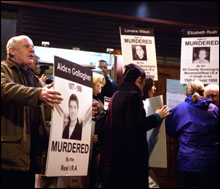The end of the Cold War didn’t bring peace, only a proliferation of conflict. We here in the US are just starting to note that, because about a thousand of our troops are getting killed every year. Iraq inevitably makes an appearance in this year’s Human Rights Watch International Film Festival selections, but so too do conflagrations in places most Americans don’t know exist till they pop up briefly with brutal footage on CNN. Then there are those other wars, of mind and spirit and ideology, that might be the most decisive of all.
But first, there’s Iraq. Its title rivals that of Looking for Comedy in the Muslim World, but unlike Albert Brooks’s comedy, Sean McAllister’s The Liberace of Baghdad (2004; Coolidge Corner January 21 + 26; PEM January 22) doesn’t cop out. A BBC journalist on assignment in Baghdad, McAllister was drawn to the Iraqi piano player entertaining the newsmen, contractors, and mercenaries hanging out in the bar of his hotel. Samir Peter, once the toast of the Baghdad concert scene and the self-named “Liberace” of the title, now earns a few bucks a night playing tunes between RPG blasts and car bombs. A lapsed Christian, lover of “Western music and women,” he might not represent the average Iraqi, but as he accompanies McAllister through checkpoints and bloody rubble, chatting about such subjects as his ex-wife in America, the neighbor his daughter saw get gunned down, and the cost of a Kalashnikov, you get a much better sense of present-day Iraq than you could from any news broadcast.

 Margaret Loescher’s amateurish but intense video diary Pulled from the Rubble (2004; MFA January 22, 26, 28) also brings the war closer to home. On August 19, 2003, her father, Gil, a researcher into humanitarian relief, sat in a meeting with several others in the office of Sergio Vieira de Mello, head of the UN effort in Iraq. A car bomb destroyed the building, killing 21 people. Everyone in Vieira de Mello’s office died except Loescher. He’s first seen taking tentative steps on the twin prosthetics replacing his legs, which he lost from the hip. His daughter’s camera captures these and other harrowing moments in her father’s recovery and includes footage of the blast and its aftermath. Less compelling is her voiceover commentary, which tends to the self-indulgent and sophomoric.
Margaret Loescher’s amateurish but intense video diary Pulled from the Rubble (2004; MFA January 22, 26, 28) also brings the war closer to home. On August 19, 2003, her father, Gil, a researcher into humanitarian relief, sat in a meeting with several others in the office of Sergio Vieira de Mello, head of the UN effort in Iraq. A car bomb destroyed the building, killing 21 people. Everyone in Vieira de Mello’s office died except Loescher. He’s first seen taking tentative steps on the twin prosthetics replacing his legs, which he lost from the hip. His daughter’s camera captures these and other harrowing moments in her father’s recovery and includes footage of the blast and its aftermath. Less compelling is her voiceover commentary, which tends to the self-indulgent and sophomoric.
Rubble frustrates because it refuses to go beyond personal experience. In one scene, another survivor of the blast speculates on why the mission was left so vulnerable (the UN packed up and left shortly afterward), but such topics are cut short. Not so in Peter Travis’s fictionalized Omagh (2004; Coolidge Corner January 20). In August 1998 a car bomb from the “Real IRA” killed 31 people in the Tyrone title town. Travis captures the horror of the event with electric immediacy. (The film was co-scripted by Peter Greengrass, director of Black Sunday.) Like his protagonists, though, he doesn’t stop there. Relatives of victims, both Catholic and Protestant, unite and organize to press the authorities into bringing the culprits to justice. Along the way they learn that culpability is not limited to a splinter group of the IRA.
With its revelations of warnings of the attack that went unheeded by authorities, of screw-ups and cover-ups and possible conspiracies, Omagh seems a premonition of our present state of affairs. Pamela Yates’s over-earnest but illuminating State of Fear: the Truth About Terrorism (2005; Coolidge Corner January 20-22), on the other hand, all but provides a blueprint. It’s 1980, and Peru is divided between the privileged classes of Lima and the dirt-poor, mostly Indian inhabitants of the jungles and mountains. Abimael Guzmán, an academic and revolutionary, inspires the downtrodden with his Marxist mishmash. His Shining Path becomes the Al-Qaeda of Peru.
The government’s attempts to quash the movement by brutal occupation of the countryside only alienate the population, adding to the rebel ranks. Finally, using traditional police methods, a Lima detective bags Guzmán (the basis for John Malkovich’s The Dancer Upstairs) and the revolution collapses overnight. Seeing his opportunity, President Alberto Fujimori takes credit for Guzmán’s capture and perpetuates the illusion that the terrorist threat persists. Preferring security to democracy, Peruvians approve Fujimori’s dissolution of Congress and establishment of emergency powers. The result is a decade-long dictatorship that claims thousands of lives and is brought down only by its own hubris, greed, and corruption.